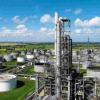|
|
Pressure Drop In Pipes
Started by tribleprince, Feb 13 2012 11:23 PM
9 replies to this topic
Share this topic:
#1

Posted 13 February 2012 - 11:23 PM
hi all
i am confuse about air pressure drop in pipes. Pipe (Stainless steel) inner dia is 15.05 and having HP air of 200bars and it opens in atmosphere. Air is stored in a cylinder.
My question is that, whether most of the pressure drop will occur in pipe or at pipe opening to atmosphere?
My understanding is that, that most of the pressure drop will occur in pipe (since pressure difference is very large) and at the pipe opening the pressure will be just above the atmosphere. Am i right?
Hoping for correction from you.
i am confuse about air pressure drop in pipes. Pipe (Stainless steel) inner dia is 15.05 and having HP air of 200bars and it opens in atmosphere. Air is stored in a cylinder.
My question is that, whether most of the pressure drop will occur in pipe or at pipe opening to atmosphere?
My understanding is that, that most of the pressure drop will occur in pipe (since pressure difference is very large) and at the pipe opening the pressure will be just above the atmosphere. Am i right?
Hoping for correction from you.
#2

Posted 13 February 2012 - 11:57 PM
Yes , you are right...most o0f the pressure drop will occur in pipe..
#3

Posted 14 February 2012 - 03:42 AM
tribleprince,
Lack of information especially about the pipe length, but as per very high pressure in upstream most of the pressure drop would occur at pipe opening to atmosphere due to pressure discontinuity in the form of noise, vibration,....
Fallah
Lack of information especially about the pipe length, but as per very high pressure in upstream most of the pressure drop would occur at pipe opening to atmosphere due to pressure discontinuity in the form of noise, vibration,....
Fallah
#4

Posted 14 February 2012 - 03:44 AM
The pressure at the end of the pipe could be significantly above atmospheric, depending on the length of the pipe. If the pipe is short and the velocity at the outlet is sonic then the velocity head could be around 70 bar. Depending on the pressure in your cylinder and the size of the valve on the cylinder you may struggle to maintain 200 bar at the upstream end of the pipe.
Edit 15 Feb - Apologies to fallah. It looks like I was just echoing what he had already pointed out. I was replying at the same time as he and it was only after I hit "post" that I saw what he had written. But it is reassuring to know that we agree.
Edit 15 Feb - Apologies to fallah. It looks like I was just echoing what he had already pointed out. I was replying at the same time as he and it was only after I hit "post" that I saw what he had written. But it is reassuring to know that we agree.
Edited by katmar, 15 February 2012 - 01:25 AM.
#5

Posted 15 February 2012 - 12:58 AM
thanks to all of you.
Length of pipe is 6 meter, so what will be the result?
what i understood from the replies is that most of pressure will drop in the pipe and at the pipe opening pressure will be somewhat above atmosphere. plz correct me
thanks again
Length of pipe is 6 meter, so what will be the result?
what i understood from the replies is that most of pressure will drop in the pipe and at the pipe opening pressure will be somewhat above atmosphere. plz correct me
thanks again
#6

Posted 15 February 2012 - 01:19 AM
If you really could get 200 bar at the start of the pipe (downstream of the cylinder valve) then the flowrate in the pipe would be choked at the speed of sound. You would get a flowrate of about 3 kg/s and the exit velocity head would be close to the 70 bar I mentioned before. You need to read up on the whole subject of choked and sonic flow of compressible fluids.
But if the cylinder pressure is 200 bar then you are not going to get 200 bar at the start of the pipeline. You need to include the cylinder valve in the flow analysis.
But if the cylinder pressure is 200 bar then you are not going to get 200 bar at the start of the pipeline. You need to include the cylinder valve in the flow analysis.
#7

Posted 15 February 2012 - 04:11 AM
Thank you Katmar.
Air is stored in cylinder at 200bars and the valve installed is solenoid. so when we need air we just operate solenoid and get the air at pipe opening.
Please can you provide me with the formulas (as you calculated mass flow rate and velocity head) relating to this and how can I get the air velocity in the pipe (with the help of formulas).
I am still wondering about the pressure drop in pipe since the pressure difference is too much so pressure drop will be large enough in pipe than the drop at pipe opening to atmosphere (which is my perception). I am a Mechanical engineer so understanding of flow chemistry of compressible fluid is little bit complex to me.
Air is stored in cylinder at 200bars and the valve installed is solenoid. so when we need air we just operate solenoid and get the air at pipe opening.
Please can you provide me with the formulas (as you calculated mass flow rate and velocity head) relating to this and how can I get the air velocity in the pipe (with the help of formulas).
I am still wondering about the pressure drop in pipe since the pressure difference is too much so pressure drop will be large enough in pipe than the drop at pipe opening to atmosphere (which is my perception). I am a Mechanical engineer so understanding of flow chemistry of compressible fluid is little bit complex to me.
#8

Posted 15 February 2012 - 05:37 AM
Check in your fluid mechanics handbook, or search on the internet for "isothermal compressible flow". You will find all the formulas you need.
#9

Posted 16 February 2012 - 11:53 PM
thanks to all of you especially Katmar
I am consulting Perry's Chemical Engineers' Handbook.
I am consulting Perry's Chemical Engineers' Handbook.
#10

Posted 17 February 2012 - 02:41 AM
Similar Topics
Steam Pressure In Heat ExchangerStarted by Guest_mvanrijnbach_* , 15 Apr 2025 |
|

|
||
Critical Pressure For Choke Valve SizingStarted by Guest_Sherif Morsi_* , 07 Nov 2017 |
|

|
||
Valve Cavity - Pressure Relief ValveStarted by Guest_CS10_* , 20 Feb 2025 |
|

|
||
Pressure Of An Isolated Flow In PipeStarted by Guest_phoroogh_* , 30 Jan 2025 |
|

|
||
Maximum Allowable Accumulated PressureStarted by Guest_mahmooddalvi09_* , 30 Jan 2025 |
|

|

 FB
FB









